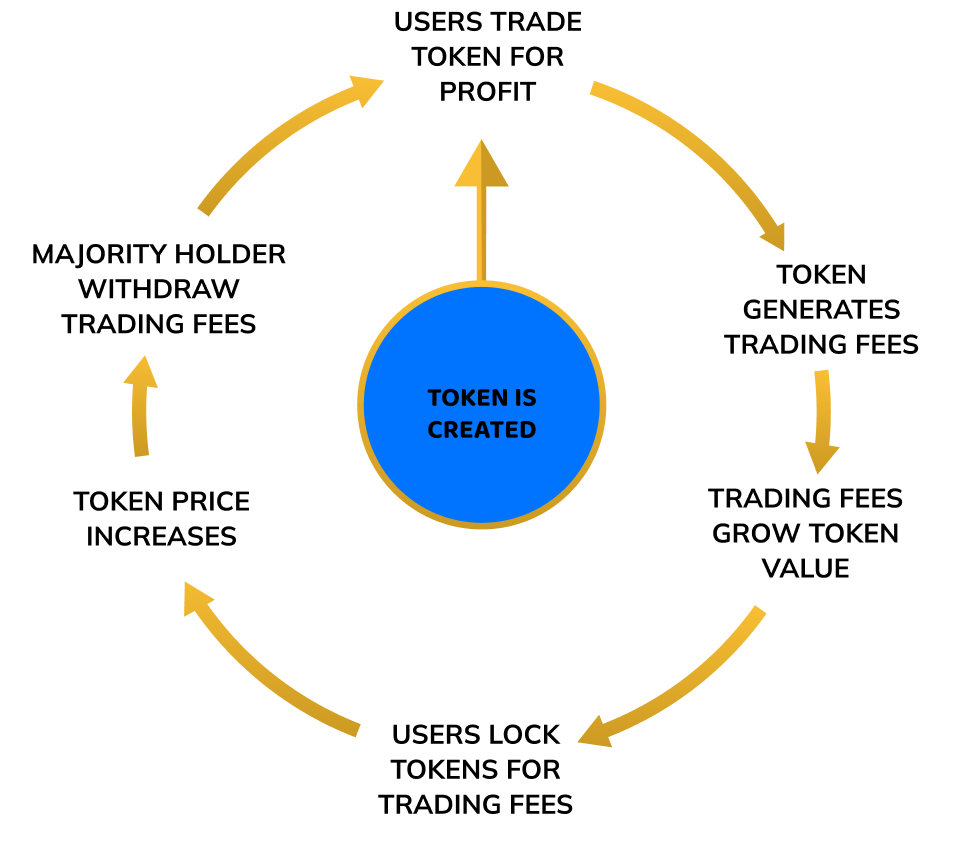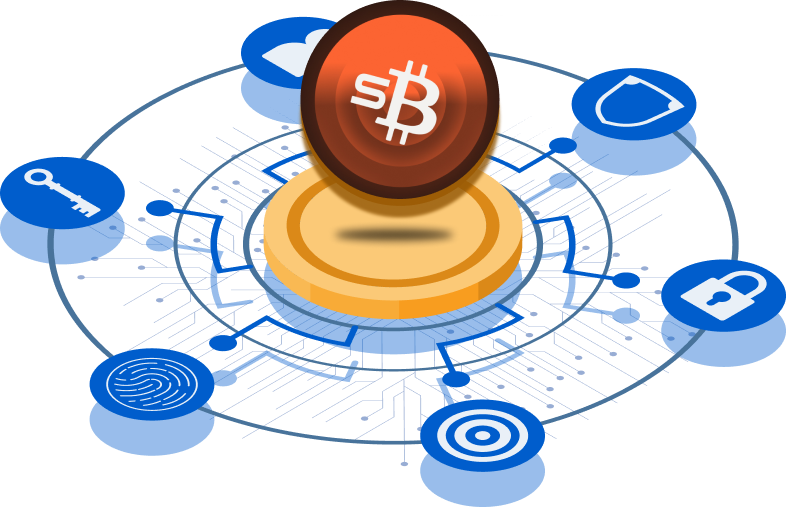Contents
- Abstract
- Introduction
- Problem Within Current Environment
- The Need for a New Approach
- Design Overview
- Token Ecosystem
- Incentive Structure and Long-Term Value Creation
- Benefits of The Solution DEX
- Feature Overview
- Core Features
- 1.1 Token is Created – No-code Interface
- 1.2 Users Trade Token for Profit – Trading Pairs in SBTC
- 1.3 Token Generates Trading Fees – Automated Fee Collection
- 1.4 Trading Fees Grow Token Value – Fee Dynamics
- 1.5 Users Lock Tokens – NFT Integration
- 1.6 Token Price Increases – Competition Drives Value
- 1.7 Majority Holder Withdraw Trading Fees – Majority Holder Rewards
- Looking Ahead
The Solution DEX: A Stock Market for Bitcoin
Abstract
The Solution Decentralized Exchange (DEX) is a trading platform designed to function as a decentralized stock market for Bitcoin. Built on Bitcoin’s security and the Stacks blockchain, the platform allows users to create and trade tokens unlike traditional systems, The Solution DEX leverages smart contracts to dynamically adjust token prices based on trading activity, ensuring fair and automated price discovery. This ensures fair and predictable price discovery without relying on order books. Each token has a fixed supply of 21 million from inception, eliminating inflation and dilution risk. Trading fees are transparently locked on chain, with the largest token holders incentivized to grow the token’s value through these earnings. By combining Bitcoin’s security with innovative trading mechanisms, The Solution DEX offers an uncompromised and safeguard marketplace for tokenized assets.
Introduction
Financial markets—from traditional stock exchanges to cryptocurrency platforms—face significant challenges. Stock markets depend on quarterly earnings reports, leaving investors to base decisions on delayed and often incomplete data. Cryptocurrency platforms often suffer from a lack of transparency, fragmented liquidity, and unpredictable pricing systems. For tokenized assets, these issues are compounded by inflationary tokenomics and dilution, eroding investor confidence and long-term value.
The Solution DEX addresses these challenges by offering a dependable and secure platform for creating and trading tokenized assets. Built on Bitcoin’s security and the Stacks blockchain, the platform uses smart contracts self-executing programs on the network to implement a formula that dynamically adjusts token prices based on trading activity. This innovative pricing mechanism ensures fair price discovery without relying on traditional order books. Each token is minted with a fixed supply of 21 million from inception, eliminating inflation and dilution risk, while trading fees are collected and locked transparently on chain. These on-chain fees can only be accessed by the largest token holders, who are incentivized to grow the token’s value over time. By solving key limitations in both traditional and decentralized financial systems, The Solution DEX introduces a sustainable model where token value is directly tied to on-chain activity, providing a new standard for security and governance within decentralized markets.
The advent of decentralized finance (DeFi) has highlighted the limitations of traditional financial systems and existing token exchanges. Centralized platforms often face manipulation and transparency issues, while decentralized alternatives struggle with liquidity and fair price discovery. Moreover, created tokens face significant challenges, including inflationary pressures and dilution risks.
The Solution DEX aims to address these shortcomings by integrating Bitcoin’s security model with Stacks blockchain’s programmable smart contracts. By addressing inefficiencies in token creation, monetization, and NFT integration, this platform provides a seamless user experience that fosters innovation and utility in the Bitcoin ecosystem.

Problem Within Current Environment
Traditional Trading Markets
Traditional trading markets suffer from several inefficiencies and inequities:
- Arbitrary Pricing: Prices often depend on order books and constant trading activity to maintain liquidity, leading to unpredictable and inefficient price discovery.
- Dilution Risk: Stock owners can issue new shares at their discretion, reducing the value of existing holdings.
- Limited Accessibility: Not all users globally have equal access to these markets, and over-the-counter (OTC) trades often suppress transparency and hinder new price discovery.
Decentralized Exchanges
While DEXs aim to improve transparency and accessibility, they face their own challenges:
- Lack of Long-Term Incentives: Many tokens on DEXs lack sustainable mechanisms to reward long-term investment, resulting in limited appeal for users to hold tokens over time.
- Liquidity Challenges: Without sufficient and stable liquidity, price discovery and trading efficiency are often compromised.
Issues with Bitcoin Investing
Despite Bitcoin’s widespread adoption and recognition as a store of value, it presents unique barriers for many investors:
- High Entry Costs: Bitcoin’s high price makes it feel unattainable for smaller investors, even with fractional ownership.
- Diminishing Short-Term Gains: As Bitcoin’s price stabilizes over time, the potential for rapid, significant returns diminishes, leaving smaller investors seeking more immediate opportunities.
- Institutional Dominance: Large institutional players dominate Bitcoin markets, driving volatility and sidelining smaller investors from meaningful participation.
The Need for a New Approach
Traditional trading markets and decentralized exchanges—while each serving critical roles in their respective ecosystems—exhibit inherent challenges.
Traditional Trading Markets
The Solution DEX addresses the challenges of traditional markets by introducing a immutable, formula-driven pricing mechanism implemented through smart contracts. This approach eliminates the need for order books, while ensuring fair and efficient price discovery. With all tokens minted at the outset and capped at a fixed supply, investors are protected from dilution. The platform is accessible globally, requiring no personal information, and all trades are permanently recorded on the blockchain for transparency.
Decentralized Exchanges
The Solution DEX overcomes the limitations of existing DEXs by providing sustainable incentives for long-term participation. Majority token holders can lock their supply to create stable trading liquidity for others, earning a share of trading fees collected from token transactions. This model aligns incentives, rewards active participation, and ensures the long-term growth of the ecosystem.

Design Overview
The Solution DEX is designed to address critical limitations in traditional and decentralized trading systems. By leveraging Bitcoin’s security and the Stacks blockchain’s smart contract capabilities, the DEX creates a secure and reliable environment for creating and trading tokenized assets.
Unlike traditional markets, where prices rely on order book or centralized systems, The Solution DEX uses a smart contract to implement a formula that dynamically adjusts token prices based on trading activity. This ensures fair and predictable price discovery while eliminating manipulation. Furthermore, all tokens are minted at the outset with a fixed supply of 21 million, ensuring scarcity and preventing inflation or dilution. These features combine to create a system that is accessible and sustainable.
Token Ecosystem
Fixed Supply and Smart Contract Governance
Each token created on The Solution DEX is capped at a supply of 21 million, following Bitcoin’s principle of scarcity. This scarcity is enforced by tamper-proof smart contracts, ensuring that the supply cannot be altered after issuance. Token creation is accessible to anyone through a no-code interface, allowing users to design and deploy tokens easily without technical expertise.
Decentralized Trading and Price Discovery
All tokens are traded against SBTC, integrating the trust and stability of Bitcoin’s ecosystem. The DEX eliminates the need for intermediaries, enabling peer-to-peer trades in a secure and decentralized marketplace. Prices are determined by a formula within the smart contract, which dynamically adjusts based on trading activity. This approach provides a safe and fair, avoiding the inefficiencies and manipulation common in order-book-based systems.

Incentive Structure and Long-Term Value Creation
- Trading Fees and Liquidity Incentives: Trading fees are automatically collected on chain via smart contracts and allocated to majority token holders who lock their tokens to contribute to the market’s liquidity. By locking tokens, these holders stabilize the market and are rewarded with a share of the collected fees. This structure aligns the incentives of token holders with the platform’s long-term growth, ensuring sustained trading activity and liquidity.
- NFT Integration and Enhanced Utility: Locked tokens can be linked to unique NFTs, providing additional utility and engagement opportunities. NFTs tied to locked tokens enable exclusive ownership, branding, and access to specific features or rewards, enhancing the overall ecosystem’s value and appeal.
- Majority Holder Rewards: Only majority token holders who lock a portion of their supply are eligible to withdraw trading fees. These rewards are distributed transparently via smart contracts in SATs, tokens, or NFT-based incentives. To maintain market stability, a lockout period is enforced for fee withdrawals, preventing sudden liquidity shocks.
- Benefits of The Solution DEX: The Solution DEX combines Bitcoin’s security, a formula-driven pricing mechanism, and a sustainable incentive model to address key issues in traditional and decentralized markets. By ensuring scarcity, transparency, and accessibility, the platform creates a just and innovative marketplace where token value is tied directly to blockchain-verified activity. This approach eliminates inflation, encourages long-term investment, and ensures that market participants are incentivized to foster growth and stability.

Feature Overview
The Solution DEX introduces key features that work together to create a efficient and sustainable trading ecosystem. Below is a summary of the platform’s core functionalities:
Core Features
1.1 Token is Created No-code Interface:
A user-friendly platform allows token creators to design and deploy tokens without any coding knowledge. The streamlined interface simplifies token creation, ensuring accessibility for all users.
- Maximum Supply of 21 Million: Following Bitcoin’s principle of scarcity, each token’s supply is capped at 21 million. This ensures intrinsic value and prevents inflation, making tokens attractive as a store of value.
- Smart Contract Governance: Tokens are governed by tamper-proof smart contracts that enforce the 21 million supply cap and other rules, ensuring security.
1.2 Users Trade Token for Profit Trading Pairs in SBTC:
All tokens are traded against SBTC, providing a stable and trusted trading environment anchored in Bitcoin’s ecosystem.
- Decentralized Marketplace: A secure trading environment where users can buy, sell, and exchange tokens without relying on intermediaries.
- Smart contracts ensure secure and traceable transactions.
- Transparent Price Discovery: Fixed price increments per transaction promote fair market valuation, reducing risks of price manipulation.
1.3 Token Generates Trading Fees Automated Fee Collection:
Smart contracts collect fees from every trade, ensuring seamless and verifiable transactions.
- Fee Redistribution: These fees are allocated to incentivize liquidity and reward token holders, fostering a sustainable and active trading ecosystem.
- Creator Benefits: Token creators who lock their holdings can also earn a share of trading fees, aligning their interests with traders.
1.4 Trading Fees Grow Token Value Fee Dynamics:
Accumulated trading fees are redistributed to liquidity pools, increasing the attractiveness of holding and trading tokens.
- Long-term Incentives: Even if the token’s price fluctuates downward, the growing trading fees create a compelling reason for users to remain engaged, ensuring sustained trading activity.
1.5 Users Lock Tokens NFT Integration:
Users can lock tokens and link them to unique NFTs, adding utility and engagement to token holdings. This integration allows:
- Exclusive Ownership: NFTs tied to locked tokens can represent ownership or branding opportunities.
- Enhanced Rewards: Unlock additional features, benefits, or rewards tied to the NFT.
- Liquidity Locking: Users locking tokens contribute to the market’s baseline liquidity, ensuring security and incentivizing trading activity.
1.6 Token Price Increases Competition Drives Value:
As users compete to lock tokens and earn trading fees, the demand for tokens increases, leading to price appreciation.
- Liquidity Incentives: By locking tokens, users foster a stable market environment, further boosting the token’s value.
- Smart Contract Automation: The system ensures reliable and predictable price discovery through automated increments per transaction.
1.7 Majority Holder Withdraw Trading Fees Majority Holder Rewards:
Only the majority token holders who lock a portion of their supply are eligible to earn trading fees. This incentivizes liquidity and creates a competitive environment.
- Reward Distribution: Fees are distributed via smart contracts, rewarding majority holders with SATs, tokens, or NFT-based incentives.
- Liquidity Lockout Periods: Prevents sudden liquidity shocks by enforcing a lockout period for fee withdrawal, ensuring market stability.

Looking Ahead
The Solution DEX is more than just a platform for Bitcoin it is a blueprint for the future of decentralized trading. While it currently operates within the Bitcoin ecosystem, the application concept is adaptable to any blockchain that meets specific technical requirements, including faster settlement times and on-chain governance controls. This adaptability makes it a versatile tool for reducing inflation and maintaining trading fee integrity across different networks.
By leveraging its transparent fee structures and token scarcity models, The Solution DEX provides a mechanism that stabilizes digital assets while ensuring long-term sustainability. This approach allows for meaningful value retention by tying token utility directly to market activity and incentivizing participants to foster a self-sustaining economy.